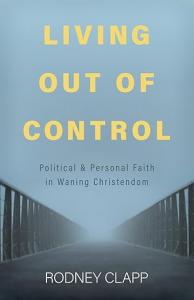Here I continue ongoing discussion of the book Living Out Of Control: Political and Personal Faith in Waning Christendom by Rodney Clapp. (Here I will refer to the author as Rodney as we are friends.) Chapter Two is Responsibility as Response-ability.
If you have read the chapter, feel free to comment. If not, you may ask a question. In either case, observe the rules at the end here.
In this brief chapter, Rodney argues that we, God’s people, are not called to be in control of anything except ourselves. In fact, God is not a controlling God. “In short, the God with whom we have to do is not a control freak. Instead, this God shapes and molds a creation that plays a significant hand in its own future.” (15) Although Rodney does not mention Tom Oord, I think they would agree about much. However, Rodney does concede that God does occasionally intervene.
A theme of the chapter is our human interdependence. We are not, as Western modernity says, individual, autonomous selves over against others. That is a theme I associate especially with my late friend, theologian Stan Grenz. I especially appreciate this sentence of Rodney’s: “The Bible pictures a God who works by what we might call a narrative logic.” (19) That is, the God of the Bible, our God, does not seek to control anyone or anything as much as to work with us in relationships.
Here is the thematic sentence of the chapter: “Just as God relinquishes a degree (or a kind) of control, the church is meant to live out of control. The church’s only recourse and intention, in fulfilling its mission in the world, is persuasion.” (20)
So, in a time of “waning Christendom,” according to Rodney (and others), Christians are called not to recoup control over society or culture but be a city on a hill showing the world God’s way by example and persuasion only.
I agree, except… I would say that as Christians we can and should look for ethical middle axioms to work together with non-Christians to steer society toward a more humane way of living and treating people. I have here written about John Rawls’s theory of justice as an example of such.
I also think we should, gently but firmly, seek to block alternative worldviews when people seek to make them dominant, coercive, overly influential, to the exclusion of biblical-theistic values. For example, Social Darwinism is an alternative worldview to Christianity and to biblical theism in general. And it is growing in strength and influence. We should start among ourselves to proclaim it a heresy and then find allies, both religious and secular, to counter its influence in society.
True Christianity is against Social Darwinism and, to that extent, Christendom is better than Social Darwinism-dom. We in America are entering a new era of the powerful influence of Social Darwinism, similar to the 1890s. Social Gospel Christians linked up with Progressives in the first decades of the 20th century to counter Social Darwinism’s influence. We should do it again. I do it here by criticizing neo-liberalism. (Rodney also has a book against neoliberalism entitled Naming Neoliberalism.)
*Note: If you choose to comment, make sure your comment (or question) is relatively brief (no more than 100 words), on topic, addressed to me, civil and respectful (not hostile or argumentative), and devoid of pictures or links.*














